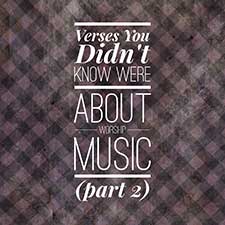Verses You Didn’t Know Were About Worship Music (Part II)

In the last post, we saw how Paul made a deliberate decision to exclude the human tools of rhetoric from his preaching of the gospel of Christ. He knew that by adding a heavy emotional pull to his evangelism, he would see people come to Christ simply because they were caught up in a state of heightened feeling.
Instead, Paul made sure that what affected his audience members was the power of God that was behind the gospel. Just how did he do that?
The Power of God
First of all, let’s establish what Paul was not saying. He was not stating that our worship and proclamation of the gospel should be void of emotional content. How could it be?
Our salvation from eternal condemnation and our restored relationship with God should inspire great emotional response. Paul frequently uses beautiful, poetic language in his letters to show just how deeply God’s love has touched his heart.
Consider these passages written by Paul, which are beloved by all true Christians:
- “O the depth of the riches both of the wisdom and knowledge of God! How unsearchable are his judgments, and his ways past finding out!” (Romans 11:33)
- “For I am in a strait betwixt two, having a desire to depart, and to be with Christ; which is far better:” (Philippians 1:23)
- “Cease not to give thanks for you, making mention of you in my prayers; That the God of our Lord Jesus Christ, the Father of glory, may give unto you the spirit of wisdom and revelation in the knowledge of him: The eyes of your understanding being enlightened; that ye may know what is the hope of his calling, and what the riches of the glory of his inheritance in the saints, And what is the exceeding greatness of his power to us-ward who believe, according to the working of his mighty power,” (Ephesians 1:16-19)
The issue that Paul is getting at in I Corinthians 2:1-5 is one of clarity. The emotion that he revealed while preaching the gospel was never in danger of obscuring the truth of his message. He made sure that he did not bring a crowd to tears with skillful speech and then invite them to give their hearts to God. When someone fell before the Lord during a sermon of Paul’s, it was because they had been touched by God’s supernatural working, not by Paul’s ability to turn a phrase.
This is the mystery of the gospel—that it is foolishness to the lost but the power of God to those who know Him.
If a particular style of music or method of presentation “fits in” with what most people in the lost world enjoy, it is by definition not foolishness to the lost.
Ministers of music should be extremely cautious about using such music in a worship context, and even more cautious about using it for evangelism.
Paul’s focus in this passage is on evangelism, and we understand that worship, in contrast, is primarily intended for believers and directed toward God. But the root principle is unmistakable:
Human devices that arouse the emotions are very dangerous when combined with the testimony of God. The moment emotion moves from a supporting to a leading role, it derails our worship and turns it into a human-centered experience.
It is up to us as ministry leaders to constantly monitor the response of our congregation to our musical presentation, looking for indications that we might be moving people with the wisdom of men instead of allowing God to use His power to move them.
To lost humanity, affecting the emotion is the supreme goal of art. Painting, acting, poetry, and especially music are all directed toward altering the feelings of those in the audience. When worship of the one true God is the goal, however, even emotion must assume the role of a servant.
Just as we desire for our church members to look past the people on the platform and see truth about God instead, we should endeavor to present music that places God’s majestic attributes front and center.
If our worship is genuine, there will be an appropriate emotional content to it automatically. However, deliberately using the most powerful emotional tools that our culture has been able to design will almost certainly take the place of whatever words we are singing.
There are a myriad of specific applications that Paul’s warning should inspire. My prayer is that each person who leads God’s people in worship would humbly seek to present truth about God while keeping emotion in the correct balance. The result will be worship that the world does not understand completely, but that brings true believers closer to their Lord.